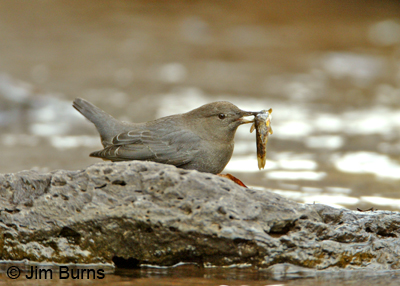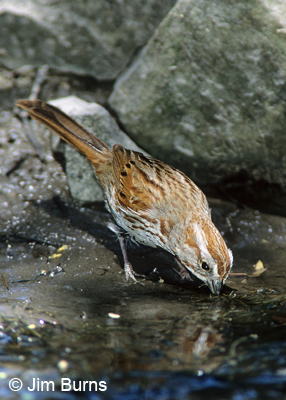
I’m sitting in the morning sun, sitting on a log in a creek, wasting time. Otis Redding is playing in my head. Jenny Creek has a sand bottom overlaid with boulders, most of them flattish, many of them covered with slick moss. It runs ten feet wide and calf deep, with a few plunge pools that might be over my head. We (tripod, telephoto lens, and I) are in an inner montane valley in Oregon’s Siskyou mountains. Down in town the locals are experiencing a heat wave, not a cloud in the sky and the thermometer nipping at 100 degrees, but my log is just above the burbling current and I have my feet, hiking boots, socks and all, submerged in the cold water. I’m feeling no pain, and since it’s not salt water, neither is my tripod.
An American Dipper flies upstream, inches above the water as they will do, and inches from my legs. It disappears around a bend in the willow lined creek without stopping for pleasantries or to have its portrait snapped. I stir myself anyway, and swivel the lens to point in the general direction of the upstream willows where a Spotted Towhee is double-raking the ground debris for breakfast. My feet are so numb from the cold water, the movement feels good.
Weather is all relative. The locals are complaining about the humidity, but I’m laughing inside at them. The day after we left The Valley we couldn’t have left The Valley because Sky Harbor grounded all planes at 119 degrees. Now Arizona’s monsoon is off and running. Off and dripping, actually. Coming down from the trailhead, negotiating the incline under the bridge, feeling for every foothold on the slick rocks, I worked up a sweat, but Oregon heat really is a dry heat. The minute I put my feet in the creek I stopped sweating and started chilling. I’d bottle this and ship it home.
When I clambered down the hill I startled the bejesus out of a pair of Belted Kingfishers lolling in the shade under the bridge. Now the female bursts past me, just above my head, returning the favor, her strident rattle shattering the velvet background sound of water over rocks. Luckily I’m sitting down, well balanced on the log, but I know she’s laughing anyway. I feel a little guilty, just sitting here cooling my heels while the avian forms are scurrying around making a living. I wrap my mind around the mountains’ solitude. No traffic noise, my cell phone still on airplane mode, I’ve nothing to do until the sun goes down. Loneliness has always been a guilty pleasure for me. I catch myself wondering if Otis Redding was into birds at all. There would have been a lot to see around San Francisco Bay.
A Song Sparrow pops out onto the rock next to my log. I freeze. It drinks, then ladders up a willow to declare territoriality from the uppermost branch, then dives into a thicket as the latter day pterodactyl we call Great Blue Heron inexplicably drops over the eastern ridge and splashes into the creek. I’m always surprised at the places I see Great Blues. Why here in the mountains of Oregon? The fish I’ve seen around my feet I’d call fingerlings. I know next to nothing about fish, but you’d have to guess Great Blues would be anywhere kingfishers ply the waters.
Downstream a deer materializes next to the creek, peering intently in my direction. I freeze again. It drinks, then ambles away through the pines flushing an unidentifiable accipiter which streaks down the watershed, never clearing the horizon. “Loneliness won’t leave me alone.” Redding’s biggest hit was a reflection of his life on the road. When I meet Deva for dinner I may trot out an old family joke—“Let’s toss our return tickets into the trash and stay on the road forever.” She’ll give me that look of course, but I’ll talk her into coming with me tomorrow—just sitting in Jenny Creek watching the birds, and the world, go by. Too bad I can’t whistle.
